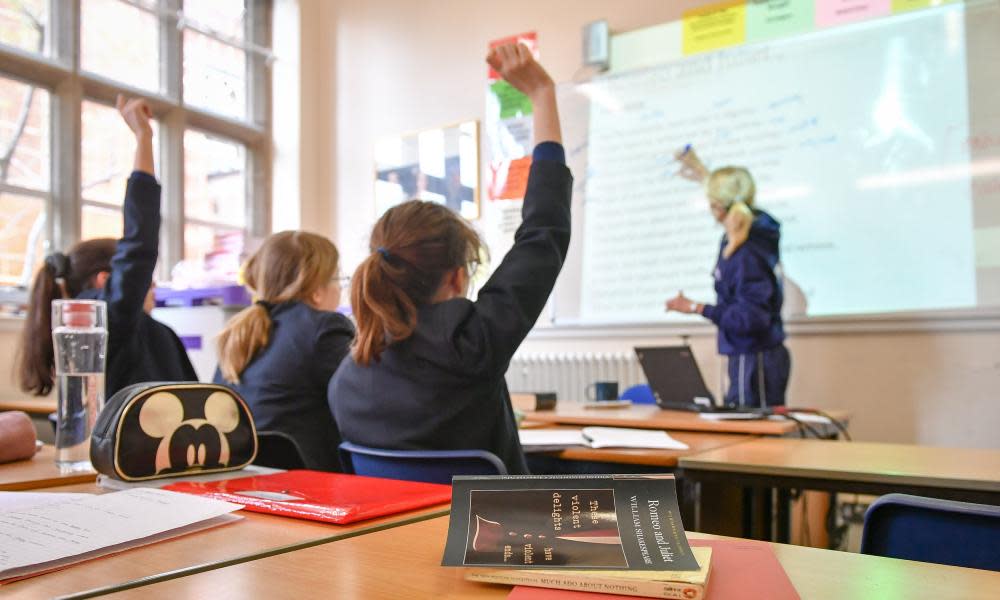Student teachers should spend more time on practical skills, less time on philosophy of education, panel recommends

Student teachers should spend more time on practical skills and less time on the history and philosophy of education, an expert panel has recommended.
The teacher education expert panel, set up by the federal government to improve teaching courses and address workforce shortages, released its discussion paper on Thursday, outlining plans to radically reform degrees.
It proposed strengthening standards for initial teacher education (ITE) programs and placing greater accountability on universities to prove their success rates.
The chair of the panel, the University of Sydney vice-chancellor, Mark Scott, said teaching degrees should be geared towards evidence-based, practical outcomes to best prepare teachers for the demands of the job.
Sign up for Guardian Australia’s free morning and afternoon email newsletters for your daily news roundup
“We need to make teachers’ lives easier and make sure they spend their time doing what they came into the profession for – teaching,” he said.
“Initial teacher education can play a significant role in making sure our future teachers are properly prepared for the classroom and that they are spending time on the things that will improve student learning.
“Teachers will spend their careers dealing with complex and diverse classrooms so they need better support to effectively teach in all environments.”
Related: ‘Universally hated’: academics speak out on outsourced university courses
Scott said increasing the number of mid-career entrants into teaching would also be key to addressing shortages hitting the sector.
In a major shake-up, the paper also recommended luring mid-career entrants to postgraduate teaching courses with shorter degrees, paid employment opportunities and part-time study options.
“We know mid-career entrants generally have greater personal and financial responsibilities and the loss of income during study, the length of an ITE program and competing commitments … can be significant barriers to making the switch,” Scott said.
“The panel has identified opportunities … to support mid-career entrants into teaching by getting them into the classroom sooner and improving the flexibility of available postgraduate ITE programs.”
The panel suggested funding could be tied to individual program performance, requiring universities to disclose dropout rates and publicly report on how well prepared its students were to enter the classroom.
Dropout rates in teaching degrees are among the highest industry-wide, sitting at about 50%.
Reports would increase the accountability of universities and provide students with more publicly available information to choose providers. High performers would then be rewarded with additional federal government funding.
Related: Experts voice concerns over university’s links to Indian health ministry ‘selling snake oil’
The education minister, Jason Clare, said not enough people who started a teaching degree were finishing them.
Enrolments in ITE programs have dropped by about 20% in the past decade amid critical teacher vacancy rates and an ageing teacher workforce.
“In the first few months in this job I have got a better insight into how hard and complex the work of being a teacher is,” Clare said.
“The work of the expert panel will be important in helping us to strengthen initial teacher education, increase completion rates and deliver more classroom ready graduates.”
The University of Sydney deputy vice-chancellor, Prof Joanne Wright, said initial teacher education was the starting point of the system and a “significant part” of the solution to workforce shortages.
“The review is a welcome opportunity to reshape courses so they address the complex challenges that teachers are facing today,” she said.
“Initial teacher education plays a significant role in making sure our future teachers are properly prepared for the classroom and that they are spending time on the things that will improve student learning.”
The Australian Education Union’s president, Correna Haythorpe, said many of the issues raised in the paper directly reflected the experiences of its members and a discussion about the quality of courses was “long overdue”.
“The AEU’s early service teaching members regularly report feeling inadequately prepared for the reality of the classroom when they graduate,” she said.
“Inadequate support and inequitable school funding contributes to escalating teacher workloads and to the high turnover of teachers leaving the profession after just a few short years in the classroom.”
Haythorpe also welcomed the recognition that income loss during lengthy unpaid placements, as reported by Guardian Australia, was a “major hurdle” for students.
“The AEU has been calling for paid placements and will highlight this need in our response to the discussion paper,” she said.

 Yahoo News
Yahoo News 
